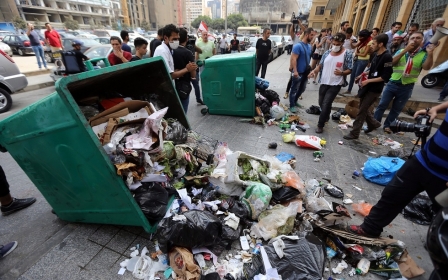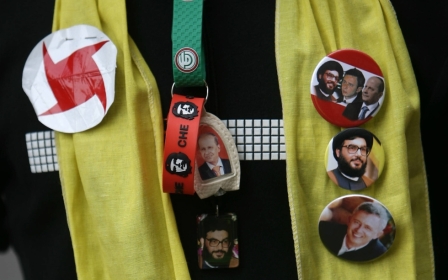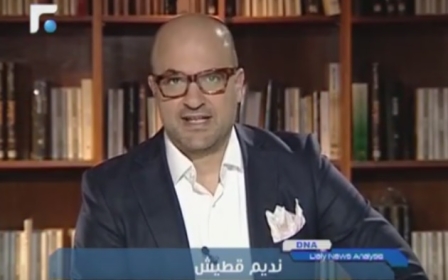Lebanon’s rubbish: Another kind of security threat

“Any decent government would have resigned.”
So commented my barber in Beirut the other day, lamenting that “we’re living in a garbage dump”.
He’s not exactly exaggerating. Over the past six months, Lebanon has staked out a prominent place for itself in the “dump” category.
In July, rubbish began piling up following the closure of the Naameh landfill, which since 1997 had served the Lebanese capital and the neighboring governorate of Mount Lebanon. Together, these jurisdictions generate about 3,000 tons of waste per day - more than half the total produced in the country as a whole.
Since last summer, informal dumpsites have proliferated along with nauseating stenches and vermin populations, while East Beirut was hit particularly hard by a fly infestation. When it rains, the streets of the capital are converted into rivers of garbage. And according to the Minister of Agriculture, Akram Chehayeb, in July 2015 alone the rampant burning of rubbish caused 250 brush fires that destroyed hundreds of acres of land.
Forget “decency.” In typical fashion, the government has repeatedly failed to find a viable solution and has now opted to implement the least practical one of all. For the next 18 months - presumably a conservative estimate given the state’s track record on punctuality - it will export the waste of Beirut and Mount Lebanon.
The undertaking will be handled by two companies: the British firm Chinook Urban Mining International and the Dutch firm Howa BV.
The specifics of the plan have yet to be revealed in full, including the precise destination of the rubbish, which will reportedly be sent somewhere either in Africa, Eastern Europe or the Middle East.
The price tag for Lebanon will be around $212 per tonne, which is approximately $52 more per tonne than the last emergency plan and about 25 percent more than what the World Bank estimates will be the average cost of managing one tonne of municipal waste in 2025.
The last emergency plan, it so happens, centred around none other than the Naameh landfill - which was meant to operate for only six years but ended up being exploited for 18, until residents of the area physically put a stop to further waste deliveries after the landfill had already exceeded 500 percent of its capacity.
Prior to the opening of Naameh in 1997, a landfill in the Beirut neighbourhood of Bourj Hammoud had serviced the Lebanese capital and Mount Lebanon since 1993, three years after the end of the civil war. In both cases, the landfills were closed due to public pressure before an alternative location had been secured. Until now, the government’s primary solid waste strategy has been to landfill the majority of the refuse while recycling a very small percentage of it - which of course becomes even smaller when Israel does things like bomb recycling facilities.
Any real resolution to the garbage situation in Lebanon requires a waste strategy based on two principles: (1) recovering recyclable materials and composting organic waste and (2) decentralising waste management.
While Lebanon’s municipalities are legally responsible for managing their own waste, the majority have not had the proper resources to do so in the post-civil war era. Thus, the government outsourced the business to the private sector, paving the way for various forms of corruption and inefficiency.
Decentralisation would not only render quantities of waste more manageable, it would also facilitate the implementation of such initiatives as home-sorting. Needless to say, the private sector has never been exceptionally keen at the prospect of losing its waste business.
Prior to the decision to begin exporting garbage, the government took a halfhearted stab at carrying out a proposal by Agriculture Minister Akram Chehayeb, who wanted to devote 18 months to establishing new landfills and to then cede waste management to the municipalities.
The plan collapsed - and not only because no region in Lebanon could be arm-twisted into hosting new landfills after witnessing the fate that befell Bourj Hammoud and Naameh.
The political paralysis currently plaguing the government - which is firmly committed to sectarian dysfunction and has for nearly two years been unable to fulfill simple obligations such as electing a president - has also complicated matters on the rubbish front. According to Chehayeb, financial competition among politicians has thrown an additional wrench into the works: “Differences over sharing the profit from the trash solutions [increased] division and obstructed solutions.”
Meanwhile, the great expense associated with the new exportation scheme would seem to confirm it’s not a sustainable solution. But the status quo is not sustainable, either. The Air Quality Associated Research Unit in Lebanon recently warned of alarmingly elevated levels of carcinogens in the air in Beirut due to waste fires, a ubiquitous occurrence in the absence of a functioning system of trash collection and disposal.
One air sample taken from the rooftop of a residential building next to a burning dump showed carcinogenic levels to be up to 416 times higher than the previous year. Among other harmful effects, this translates into an astronomically higher risk of cancer for area residents.
And while one could theoretically argue that the Lebanese government is too busy dealing with the security situation in the country to pick up the rubbish - in November, double suicide bombings in Beirut killed more than 40 people - the impending environmental and public health disaster would seem to qualify in and of itself as a pretty serious security threat.
- Marwan El Solh is an environmental consultant based in Beirut.
The views expressed in this article belong to the author and do not necessarily reflect the editorial policy of Middle East Eye.
Photo: Smoke billows from a burning garbage dump on the northern entrance to the Lebanese capital, Beirut, on 26 October, 2015 (AFP).
Middle East Eye propose une couverture et une analyse indépendantes et incomparables du Moyen-Orient, de l’Afrique du Nord et d’autres régions du monde. Pour en savoir plus sur la reprise de ce contenu et les frais qui s’appliquent, veuillez remplir ce formulaire [en anglais]. Pour en savoir plus sur MEE, cliquez ici [en anglais].





